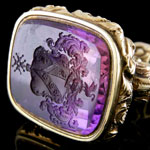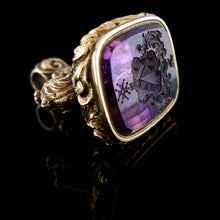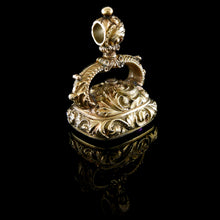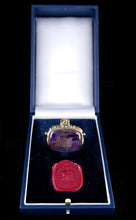Calabrian Free Corps - A British Peninsula Officer’s Gold and Amethyst Fob Seal, Circa 1830
Adding product to your cart
Height: 55mm
Gold fob chased with acanthus leaves and foliate scrollwork, set with a rectangular mixed cut amethyst intaglio seal engraved with arms and honours of Major-General Sir Octavius Carey, K.C.H., C.B., and his wife Harriot (1793-1877) née Le Marchant of Castel, Guernsey. Seal: 36mm (3.5in) x 30mm (3in).
Read more
Sir Octavius Carey (1785-1844) was born in Guernsey, Channel Islands, the son of John Carey and his wife Marie Le Ray, and entered the Army with a commission in the 3rd (King’s Own) Dragoons in 1801. In 1804 he transferred into the newly raised 2nd battalion 10th (Lincolnshire) Regiment of Foot, as part of the general expansion of the Army to counter invasion threat posed by Napoleon’s forces massing on the far side of the English Channel. However with the destruction of Napoleon’s convoying fleet off Cape Trafalgar in 1805, the emperor was forced to focus his ambitions on the European mainland. Carey, whose battalion was originally intended for home service, was likewise directed to a different quarter. In due course he reached Sicily in 1809 where the 1/10th Foot formed part of the island’s garrison against the French forces that had invaded the kingdom of Naples three years earlier and had driven Ferdinand IV and his court from the toe of Italy to Palermo.
The French crackdown on traditional Calabrian pastimes of piracy and brigandage caused Calabrian refugees to gather in Sicily. In early 1809 the British military authorities realised the potential of Calabrian hatred of a common enemy and set about raising and equipping a Calabrian Free Corps, which Carey would later command in Spain. From a nucleus of 400 men loosely organised into into ‘centuries’ under their own chiefs, the corps was expanded to include men from the Kingdom of Naples and placed under a staff of British officers of whom Carey was one. In June 1809 he participated in the capture of Scilla castle across the Messina strait which enabled General Stuart to lead a 13,000-strong expedition against Naples and temporarily capture two islands in the bay. This latter feat greatly annoyed Napoleon’s brother-in-law Joachim Murat, the innkeeper’s son who was now King of Naples, as he watched in fury from the shore.
In late 1812 Carey was sent with two ‘divisions’ of the Calabrian Free Corps to reinforce the Anglo-Spanish-Sicilian forces under Sir John Murray in eastern Spain, where the French Army of Aragon under Marshal Louis-Gabriel Suchet was still unbeaten. Murray was an officer of limited ability who had proved a source of embarrassment to Wellington years earlier in India. His role now was to distract Suchet from Wellington’s summer offensive in the north that was to culminate in the British victory at Vitoria in June 1813. Carey was accordingly present at the taking of Alcoy and, as part of Frederick Adam’s independent brigade, fought the brilliant five hour rearguard action at Biar on 12 April that allowed Murray to take up a formidable defensive position at Castalla that proved so costly to Suchet next day at the battle of the same name. In June Carey’s command was unbrigaded at the siege of Tarragona, the mishandling of which finally resulted in the removal of Murray for his indecisive and contradictory leadership by the Commander of the Forces Lord William Bentinck.
.
On 21 June Suchet was informed of the French defeat at Vitoria and immediately became aware that a strategic offensive was no longer sustainable and that the best choice was to start the retreat northward. He left Valencia on 5 July and reached Molins de Rei by the Ordal Pass road towards the end of August. In early September Bentinck’s began sending troops cautiously forward to Vilafranca, prompting Suchet to countermarch and attack the allied concentration while it was still growing in strength
On the morning of 12 September Carey’s Calabrians were ordered forward with Adam's advanced guard brigade to occupy the heights of the Ordal Cross Pass. At midnight on the 13th the position was furiously attacked by two French columns, some of ten thousand strong. Owing to the orders of a senior officer the Calabrians had been posted considerably to left of the main body of the brigade, leaving Carey without immediate support, and after two hours of continued resistance he found himself forced to retire with heavy casualties. Carey, however, maintained control and organised a fighting withdrawal through the French column and on to the road to Villa Nova. When the coast was reached Carey requisitioned boats and embarked his exhausted troops so that they were able to rejoin the army at Tarragona much to the surprise Bentinck who assumed Carey and his men were either dead or taken prisoner. It was Bentnick’s opinion that the Calabrian Free Corps were the best light infantry in the Mediterranean despite having some ‘low bred, bad Calabrese officers’.
Carey continued to serve in eastern Spain until the war’s conclusion in 1814, being advanced to the rank of Lieutenant-Colonel in the Army on 27 May 1813 and Major in 52nd Foot on 25 May 1815. He commanded of 1/57th Foot from 1818 to 1828, being created a Companion of the Bath in 1815, and, later a Knight commander of the Royal Hanoverian Guelphic Order (K.C.H.) in 1831 and advanced to Knight Commander of the Bath (K.C.B.) in 1837. Evidently a successful leader, Carey declared himself in 1836, a determined opponent of flogging in the Army, telling a Parliamentary enquiry it had a brutalizing effect, and that ‘It renders men indifferent to the punishment - generally speaking, those who are punished are men of bad character, and previously depraved.’ Furthermore the Parliamentary committee recorded that Carey had made an endeavour to preserve military discipline without capital punishment, and he had succeeded. This one fact, they said, was worth a thousand opinions.








